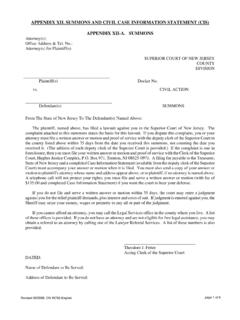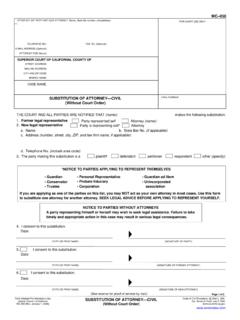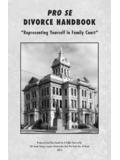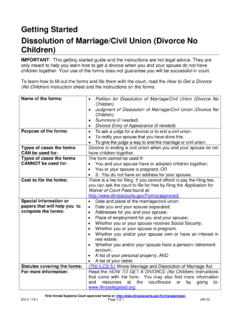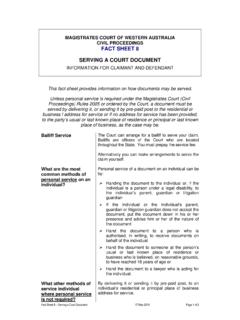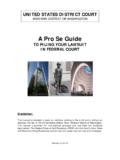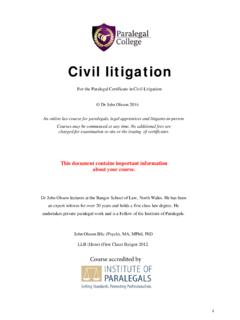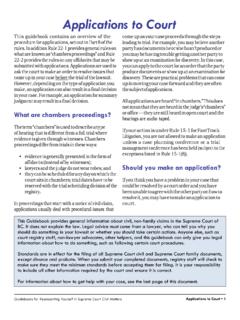Transcription of How to File a Motion in the Superior Court of New Jersey ...
1 Law-Civil-Part Motion 3/1/06 HOW TO FILE A Motion IN THE Superior Court OF NEW Jersey - LAW DIVISION CIVIL PART WHO SHOULD USE THIS PACKET You should use this packet if you want to ask the judge for a specific ruling or order during the course of your lawsuit. Any party to a case may bring a Motion . The person bringing the Motion is called the moving party. Examples of motions include: Motion to dismiss the complaint Motion for entry of default Motion to vacate a default judgment Motion for summary judgment Motion to strike an answer for failure to answer interrogatories Motion to compel discovery.
2 Caution: Some Civil Part cases are very complex and you should consider getting a lawyer. See information on page 2 titled TRY TO GET A LAWYER. Note: These materials have been prepared by the New Jersey Administrative Office of the Courts for use by self-represented litigants. The guides, instructions, and forms will be periodically updated as necessary to reflect current New Jersey statutes and Court rules. The most recent version of the forms will be available at the county courthouse or on the Judiciary s Internet site ( ). However, you are ultimately responsible for the content of your Court papers.
3 Send your completed forms to: THINGS TO THINK ABOUT BEFORE YOU TRY TO REPRESENT yourself IN Court TRY TO GET A LAWYER The Court system can be confusing and it is a good idea to get a lawyer if you can. The law, the proofs necessary to present your case, and the procedural rules governing cases in the Law Division, Civil Part are complex. Since valuable claims or potentially heavy judgments may be at stake, most litigants appearing in the Law Division, Civil Part have a lawyer. If you are being sued, please contact your insurance company to see if they might provide a lawyer for you. Most likely your opponent will be represented by a lawyer.
4 It is recommended that you make every effort to obtain the assistance of a lawyer. If you cannot afford a lawyer, you may contact the legal services program in your county to see if you qualify for free legal services. Their telephone number can be found in your local yellow pages under Legal Aid or Legal Services. If you do not qualify for free legal services and need help in locating an attorney, you can contact the bar association in your county. That number can also be found in your local yellow pages. Most county bar associations have a Lawyer Referral Service. The County Bar Lawyer Referral Service can supply you with the names of attorneys in your area willing to handle your particular type of case and will sometimes consult with you at a reduced fee.
5 There are also a variety of organizations of minority lawyers throughout New Jersey , as well as organizations of lawyers who handle specialized types of cases. Ask your county Court staff for a list of lawyer referral services that include these organizations. If you decide to proceed without an attorney, these materials explain the procedures that must be followed to have your papers properly filed and considered by the Court . These materials do not provide information on the law governing your claims or defenses; information on how to conduct pretrial discovery; information on alternative dispute resolution procedures, such as arbitration or mediation, that may be available or required in your case; information on the kinds of evidence you need to prove your claims or defenses at trial; or information on other procedural and evidentiary rules governing civil law suits.
6 WHAT YOU SHOULD EXPECT IF YOU REPRESENT yourself While you have the right to represent yourself in Court , you should not expect special treatment, help, or attention from the Court . The following is a list of some things the Court staff can and cannot do for you. Please read it carefully before asking the Court staff for help. - We can explain and answer questions about how the Court works. - We can tell you what the requirements are to have your case considered by the Court . - We can give you some information from your case file. - We can provide you with samples of Court forms that are available.
7 - We can provide you with guidance on how to fill out forms. - We can usually answer questions about Court deadlines. - We cannot give you legal advice. Only your lawyer can give you legal advice. - We cannot tell you whether or not you should bring your case to Court . - We cannot give you an opinion about what will happen if you bring your case to Court . - We cannot recommend a lawyer, but we can provide you with the telephone number of a local lawyer referral service. - We cannot talk to the judge for you about what will happen in your case. - We cannot let you talk to the judge outside of Court .
8 - We cannot change an order issued by a judge. KEEP COPIES OF ALL PAPERS Make and keep for yourself copies of all completed forms and any canceled checks, money orders, sales receipts, bills, contract estimates, letters, leases, photographs and other important documents that relate to your case. Bring 2 all documents to Court if you are notified that an appearance is necessary. 3 Adversary Your adversary in a law suit is the person or persons whose position is opposite to you. In a case in which there is only a plaintiff and a defendant and you are the plaintiff, your adversary is the defendant. Likewise, if you are the defendant, your adversary is the plaintiff.
9 In this packet, service on your adversary means service on the attorney(s) representing your adversary or adversaries and/or on any party(ies) not represented by counsel. Brief - A brief is a written argument submitted to the Court in which you present the facts and the history of your case and the legal argument supporting the request you have made to the Court in your Motion . Calendar Motion - A calendar Motion asks the Court for a ruling related to the scheduling or timing of your case, such as a Motion for more time to file papers. Before filing a calendar Motion , the moving party must try to resolve the matter with the other party(ies) in the case.
10 Certification - A certification is a written statement you make when you file your papers with the Court in which you state that all the information contained in the papers is true to the best of your knowledge. Discovery End Date The discovery end date is the date assigned by the Court by which discovery in your case must be completed. Discovery Motion - A discovery Motion asks the Court for a ruling on some phase of the discovery process such as a Motion for more specific answers to interrogatories, a Motion to compel depositions. Before filing a discovery Motion , the moving party must try to resolve the matter with the other party in the case.
